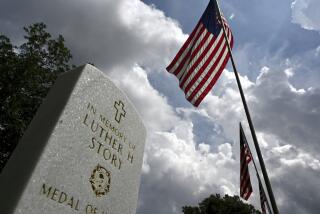Missing at Guantanamo Bay
- Share via
Army Pvt. Steve Spofford heard the news at a 6 a.m. roll call on the U.S. Naval Base, Guantanamo Bay, Cuba.
“Foraker!” the platoon sergeant called out.
Silence.
“Foraker!”
Standing in formation, Spofford felt his mind racing. It was not at all like Staff Sgt. Ryan D. Foraker to be missing. Where could he be?
No one disappears from Guantanamo, Spofford thought, least of all the soldiers in charge of guarding the captives taken during the war on terrorism. But after a search of the base and the bay that was launched that morning of Sept. 25, 2002, it soon become apparent that Foraker had vanished.
Ten years later, Foraker is still missing, and no one can explain his disappearance. The Army stopped looking for him long ago, and his friends and family hope that one day he will walk back into their lives. As they watch other U.S. troops return home, they are reminded that no one was to be left behind.
Yet Foraker is an unaccounted casualty of the war, neither a victim nor a hero — someone who one night simply slipped away.
After the roll call, Spofford and others scrambled around the compound, checking the tents and the mess halls, combing through the bowling alley, the Tiki Bar and the Windjammer Club. Dogs and search patrols covered the gym, the hospital and the Navy fleet, but no cars or boats were missing.
A tropical storm was brewing offshore, and hurricane alerts were posted. Helicopters, boats and scuba divers canvassed the water as the day turned to night. Blowing wind and drenching rain would eventually halt the efforts.
Pieces of a Haitian raft were found on the beach, caught in the fence line between Cuba and the base. Parts of a body washed up, but were identified as someone else’s.
In a crevice in the high bluffs near the prison, the searchers found Foraker’s T-shirt and shorts, neatly folded, along with a wallet, $40 and an Army ID. His boots and socks were gone.
In the days that followed, speculation grew.
Spofford wondered if Foraker had slipped from the cliffs and fallen into the sea. Perhaps he had jumped, committing suicide. Maybe he had noticed the cruise ship in the distance that had sent out a distress signal for medical help. Maybe he dove in to help.
But little made sense.
Foraker hated heights. He could barely swim. And in seven weeks, he was to go home to rural Ohio, to his wife and two young daughters.
With no answers, grief and bewilderment descended on the place they called Gitmo, and for the next several days, Spofford and several others continued to scour the bluffs before and after their shifts.
“He was my friend; he was my sergeant,” Spofford said. “But the only one who can truly answer what happened out there is him.”
No known difficulties
Foraker was by most accounts a well-adjusted 31-year-old career soldier. He first saw war in 1991 in the Persian Gulf. Afterward he joined the Army reserves, and was called back up after the Sept. 11 attacks. The Army sent him from Ft. Dix, N.J., to Guantanamo shortly after the prison opened in January 2002.
Guantanamo — this Caribbean point of land on the southern coastline of Cuba — is unforgiving and strangely beautiful. Spofford recalls how the water was “crystal clear” out beyond the prison and the bay.
But summers can be torrid, nearly unbearable without a full body armor of sunscreen and insect repellent. Banana rats like small kangaroos dart through the brown brush kicking up sand, mostly at night as they search for scraps of food. Iguanas, a protected species, rule the grounds.
On bike rides, soldiers often toured the bluffs above Windmill Beach, a spot where waves crashed and plumes of water sprayed into the air. An old ladder lay fallen and rusted on the beach, used years ago by soldiers before them.
Spofford and Foraker were military police at the base. They became friends; they were both from Ohio. They had served at Ft. Dix, and bunked together in Guantanamo because they both were heavy snorers. The last time Spofford remembers seeing his sergeant, he was lighting a cigarette and stepping outside their tent into the night, leaving the compound known as Camp America. He never returned.
The Army decided that no misconduct investigation was necessary.
A final report portrayed Foraker as a husband and father with no marital or other family difficulties. He was in “overall good health.” Nothing out of the ordinary was found in his email or among his Internet files, where he saved pictures of flowers, antique guns and possible gifts for his wife.
His finances were in order, with no large ATM withdrawals.
The scenario that Army investigators recreated of his final 24 hours revealed nothing special.
He had called home and spoken with his wife, and that night he paid a rare visit to the base clubs for a beer, then returned to his tent. Spofford remembers seeing him light that cigarette. It was just after midnight when Foraker walked outside.
Spofford questions himself for not going after him, because he seemed to be troubled about something. He rarely smoked cigarettes, for instance, preferring Copenhagen chewing tobacco. “You’re supposed to be buddies — supposed to always be with your buddy,” he said. “That’s just how the Army works. Somebody should have been with him.”
He doubts that the military did everything it could to find his friend.
“Until you get a resolution, you continue to look,” he said. “You put divers in the water for days on end and look for that body to pop up.”
But a body never surfaced. The military’s final report listed Ryan Foraker as “missing and unaccounted for.”
Still waiting
In the years since, Spofford has tried to move on. He has left the Army and returned to Ohio, where he works as a plumber and operates heavy construction equipment.
Soon after Foraker disappeared, his wife, Angela, visited the base and tossed flowers into the waters off Windmill Beach. She remarried and moved West with her daughters.
Foraker’s parents say they have lost contact with her and the girls.
Ryan’s father, Carl, grieved for his son over the ensuing years. “He aged probably 10 years in the first six months,” said Joseph Foraker, another son. “His hair turned gray. You could see it wearing on him. He was building a new house at the time, and that’s about all that kept him busy.”
Carl died of cancer in July, and in his obituary, the family did not list his missing son as living or dead, instead writing: “SSgt. Ryan Foraker, US Army, missing since September 24, 2002 from Guantanamo Bay, Cuba.”
Foraker’s mother, Ann, believes he will return. At a tree-planting ceremony in his honor in Columbus, Ohio, she refused to be consoled by Army superiors who suggested he was dead. “One of the big shots came up and wanted to give his condolences,” she said. “I said, ‘What for, did you find his body?’ He just turned around and walked away.”
Another time at the beauty shop, a stranger walked in. “He grabbed my arm and said don’t give up; your son will be home someday,” Ann recalled. “I have no idea who he was. I asked the girls and not a one of them knew him either.”
Some nights she imagines he might have been sent off on a secret mission. “If he got killed, we would never know,” she said. “We won’t know for sure until I know he’s dead.”
One of Foraker’s brothers, also named Carl, a Navy veteran who served at Guantanamo years earlier, lobbied his congressman and the Pentagon for answers, and even though some documents were turned over, he is not convinced Ryan is dead. “He left his clothes up there,” Carl said. “He intended to come back.”
The commanding officer, Col. John J. Perrone, who oversaw Guantanamo in 2002, defended the search efforts.
“Ryan was a good soldier,” he said recently. “My recollection is he went for a late night swim alone in a cove that was dangerous with tides and in an area that swimming was prohibited. It was late, the area was dark and calls for help would not be heard. We suspect it was an accident.”
Army Reserves Staff Sgt. Joe Wyatt, unit administration of Foraker’s 342nd Military Police Company from Ohio, helped lead the investigation. “We concluded it only as a missing person,” he said the other day. “They [investigators] tried to do it as a suicide, but at the end they just had it as missing.”
Wyatt added, “The problem was the sharks. If you go into the water for too long, the sharks will get you.”
Spofford finds little solace in any of these explanations. After the search for his friend, he received a plaque thanking him for his help. The plaque hangs on his wall at home, next to a photograph of Foraker. “I look at them every day,” he said.
More to Read
Sign up for Essential California
The most important California stories and recommendations in your inbox every morning.
You may occasionally receive promotional content from the Los Angeles Times.













